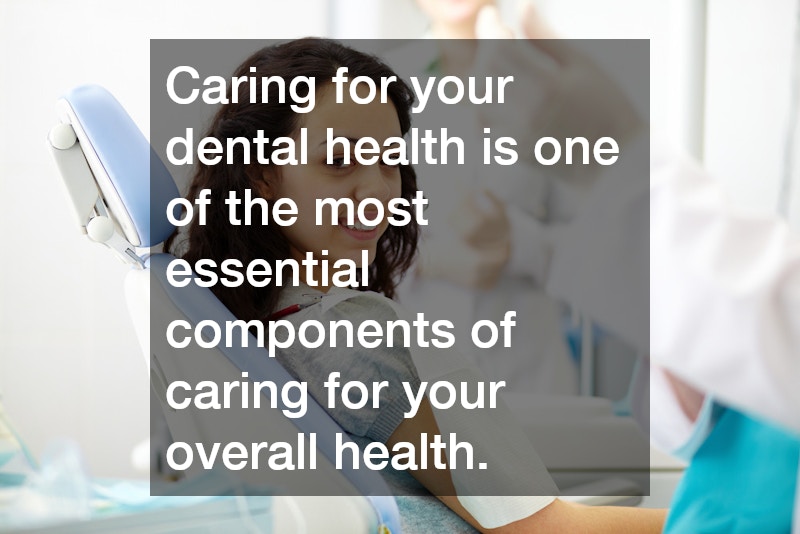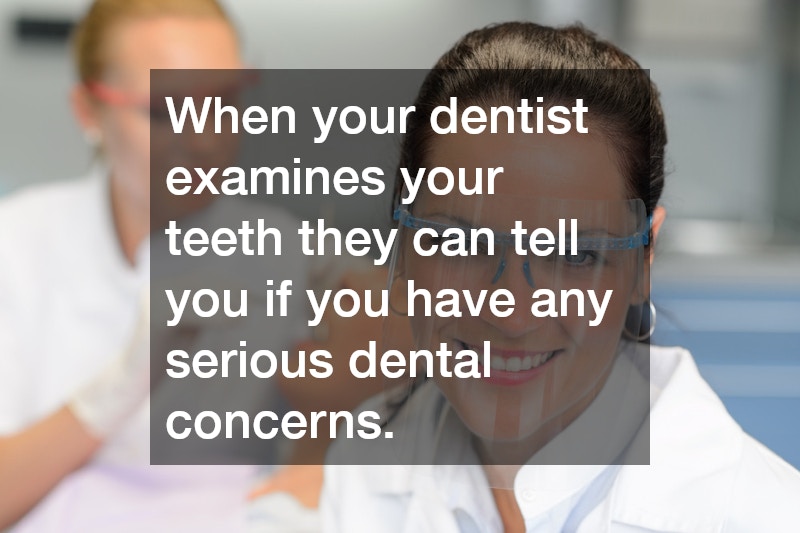
Caring for your dental health is one of the most essential components of caring for your overall health. If you neglect your dental care, it can lead to cavities and dental problems. In addition, cavities and gum infections can lead to heart problems and other serious medical complications. Therefore, developing a daily brushing and flossing routine will be essential to your health.

According to the Mayo Clinic, you should visit your dentist at least once a year. Even if you maintain good routine dental care at home, it is still essential to visit the dentist. Part of the annual visit will include routine teeth cleaning by the hygienist. You will also get annual dental x-rays and a dental exam. Your dentist’s office will keep track of your dental x-rays.

When your dentist examines your teeth they can tell you if you have any serious dental concerns. They will also check to see if you have gum disease. If so, they will develop a dental care plan. If you follow this important dentist advice, you will be more likely to maintain good dental health.

Since many people don’t visit the dentist as often as recommended, they may need emergency dental care at some point. On average, unless there is a major dental issue, people tend to wait approximately three years before they schedule a follow-up appointment. During this period, cavities, gum disease, and other issues may develop. Emergency dental care may also be required if a tooth develops an infection or when it becomes chipped or cracked.
Untreated Cavities
Recent figures show that untreated cavities are common among American adults. This applies to a minimum of one in every five adults within this country. Tooth decay is more common than both diabetes and childhood asthma. It is twenty times more prevalent than the former, and five times more prevalent than the latter.
The Centers for Disease Control and Prevention issued a report regarding untreated dental cavities in children and adolescents. According to the report, 19% of children between the ages of two to 19 have untreated cavities. The National Institute of Dental and Craniofacial Research found that a significant percentage of children have cavities in their primary teeth. When studying children within the two to 11 age group, they found that 42% of these children had primary teeth cavities.
Periodontal Disease
Periodontal disease, which is also referred to as gum disease, is also quite common. Nearly half, or 47.2% of adults over the age of 30, have some form of periodontal disease. Since this condition can advance as people age, it’s been found that it is even more prevalent in adults aged 65 or older. Recent reports indicate that 70.1% of adults within this age range are affected.
The first signs of this disease often include bleeding gums. When left untreated, this disease can be quite painful. Furthermore, it can also cause adults to lose teeth in the affected areas.
Chipped or Cracked Teeth
While people of all ages can experience a chipped, cracked, or broken tooth, this is a common dental injury among children that play sports. The American Academy of Pediatric Dentistry indicates that chipped and broken teeth account for between 10% to 39% of children’s dental injuries.
Many people choose to have restorative procedures when their teeth have been damaged. This includes single crowns, which are the most common procedure. Every year, roughly 2.3 million people choose to have implant-supported crowns. These, as their name implies, are a different procedure than basic crowns.
Missing Teeth
A large percentage of adults in the United States are partially edentulous, which means that they have one or more missing teeth. This number is expected to increase over the next 15 years to include over 200 million people. Fortunately, there are a variety of options to address missing teeth. This includes implants, bridge replacements, and partial or full dentures.
Recent figures indicate that 15 million Americans have opted for crown and bridge replacements. Implant procedures are also becoming more prevalent. This is because implants have the look, feel, and function of normal teeth.
When to Visit the Dentist
When you are experiencing a significant amount of pain or another cause for concern, you may be looking for emergency dental care services. Rather than wait until the situation worsens, it’s important to schedule an appointment with a dentist as soon as possible. If you need a tooth extracted, a temporary crown replacement, or another dental service, you want to schedule an appointment with a dentist that provides emergency dental care.
After this, it’s important to schedule future appointments as recommended by your dentist. When you have good oral health, this can have a positive effect on your overall well-being. In addition to basic check-ups, you may also want to schedule regular teeth cleaning and whitening sessions. A recent survey found that 32% of its participants were “concerned by the look of their teeth.” If you are also concerned about the appearance of your teeth, you can learn more about cosmetic dentistry procedures when you visit your family dentist.

